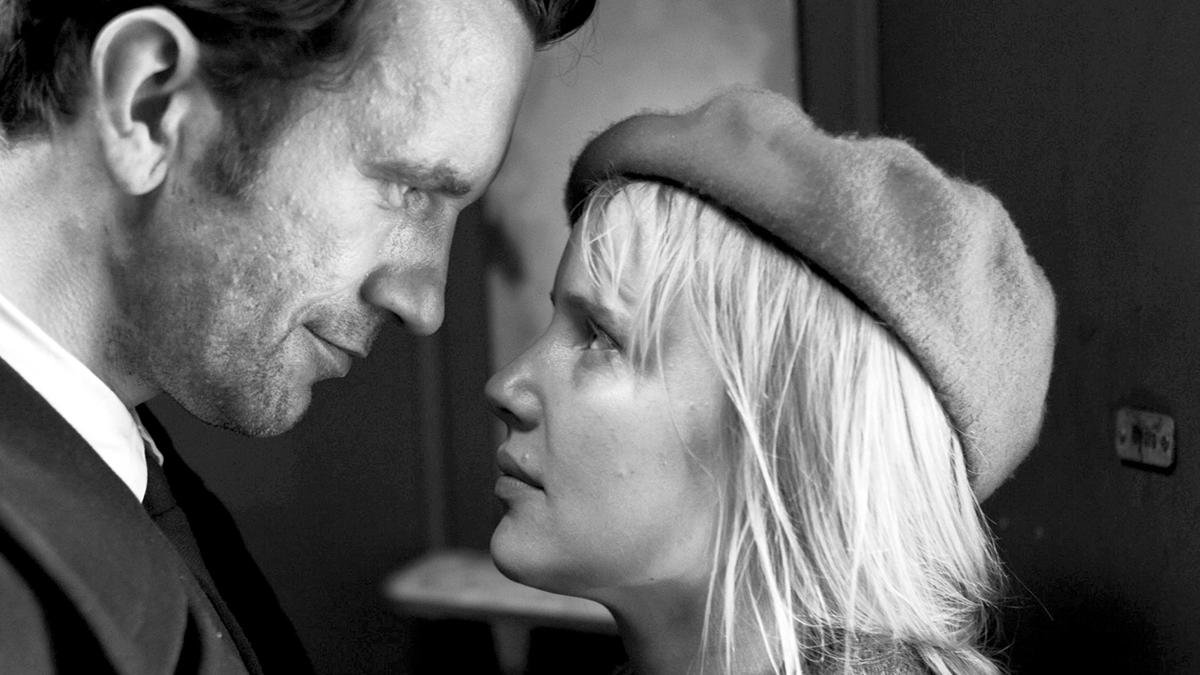Every shot is thrilling in Cold War, Pawel Pawlikowski’s follow up to Ida. Like Roma, Cold War is a testimony to the power of black and white cinema.
This lean, fast film concerns the paradox of mid-20th century discontentment. Example: At great cost to yourself, you escape the workers’ paradise of the Soviet empire, an Eden where they tie your hands. You then arrive in capitalist heaven to face what Joni Mitchell termed “the crazy you get from too much choice.” It’s the perplexity summed up by that famous shot of the mile-long supermarket aisle in The Hurt Locker. Trauma makes it hard to appreciate bounty.
The protagonist, Joanna Kulig’s lovely and infuriating Zula, is one of those Slavic types who can never really get comfortable with the frivolousness of the West. The easy morals of Paris disgust her; this movie is sort of an anti-Ninotchka. Cold War is also a study of the problem of authenticity in art—whether something pure can survive when it’s touched, either as propaganda in the East, or as material to be bought and sold in the West.
Most of all, Cold War is a lustrous romance between a Michael Fassbinder-ish pianist, Wiktor (Tomasz Kot), and the younger singer Zula, whose life is clouded by a crime she committed when she was a girl.
In 1949 Poland, Wiktor and his team are out in a tin-sided van—song-hunting in the muddy snows, searching for authentic folkloric sounds. They put up a mic in front of a toothless shouter, a woman pumping a foot-powered accordion, and a grubby little girl in a patched sweater. (His driver grumbles, “In my village, every drunk sings like this.”) After this, Wiktor’s newest job is turning a mansion the Communists seized into a music school. He decides to accept one potential rural student, a blonde girl with a big if aimless voice. It’s not the voice that interests him, it’s her look of self-amused sullenness.
Wiktor starts seeing Zula, but there’s trouble from the beginning. On her back in the summer grass, she tells Wiktor, “I’ll be with you until the end of the world.” Beat. “I’m ratting on you.”
Zula’s forced tattling to the Communist higher-ups is the first sign of trouble in an affair that lasts more than a decade. There’s one missed chance for them after another, all over Europe. First, there’s an attempted defection in Berlin, and then, years later, an encounter in the walled medieval town of Split. This seaside city is in the allegedly unaligned nation of Yugoslavia, but Wiktor finds out he’s still within the grasp of the political goons.
With every passing year, Zula is more worn away by vodka and the mediocrity of the music she has to perform, not to mention the company of the oaf infatuated with her—the commissar Kaczmarek (Borys Szyc). She’s not moving like a young girl anymore.
The true lovers get a bit of freedom in Paris, but there Zula seeks out hurt, proof of love and evidence of betrayal. It should be annoying to watch her acting out, but the excellent Kulig makes you understand Zula’s fury, and her loathing of any compromise.
As in Ida, Pawlikowski excels at summing up the Communist empire. He shows us the way that “the lever of love”—to borrow a phrase from Nabokov—was used to manipulate rebels into compliance, as well as the Soviets’ kitschy diversions and vicious punishments. Here he contrasts it with the nocturnal Paris of the existentialist days. Certainly this Paris is alluring, but it also looks dirty. (Considering the bugs, Henry Miller had asked decades before, “How can you get lousy in a beautiful place like this?”) Cold War has the heart of an epic, a smart one, burrowing into its settings and describing the bitter flavor of two different brands of moral crumble.
It’s ironic that we perceive something romantic in that Iron Curtain—as romantic as the wall in the legend of Pyramus and Thisbe. Here’s something that’s been making people tear up since Bowie’s Heroes or The Spy Who Came in From the Cold. (Some people love walls on their own, hence our current “national emergency.”)
In Cold War there’s everything the best spy films had of cynical distrust, and of love that’s a matter of life and death. On a level of entertainment alone, it’s the smart version of A Star is Born.
Cold War
Written and directed by Pawel Pawlikowski. Starring Joanna Kulig, Tomasz Kot and Borys Szyc. R; 88 minutes.














